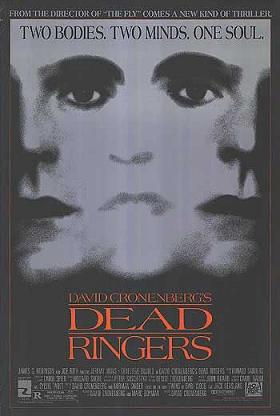During my recent endeavours to better understand Canadian cinema, I encountered a film highly regarded in its history. Consequently, I decided to give my own impressions of David Cronenberg’s 1988 psychological horror film, Dead Ringers.
The plot centres on identical twin brothers Eliot and Beverly Mantle (Jeremy Irons), prodigious gynaecologists running a renowned practice together, though this is far from the only thing they share. In addition to living with one another, the brothers also share the women they sleep with by trading places. However, it is always Eliot who sleeps with the women first, being the more confident and charismatic of the two, while Beverly tends to be reserved and submissive.
The brothers pride themselves on their synchronicity, particularly Eliot, who, despite his dominant position, seems to need Beverly more than Beverly needs him. Their bond is strained when actress Claire Niveau (Geneviève Bujold) seeks treatment at their clinic, who is the catalyst of the film’s plot.
The brothers subsequently begin a sexual relationship with Claire, despite the actress being at first unaware of their penchant for swapping identities as a means of sharing lovers. Although Claire is initially angered by the brothers’ deception, she and Beverly eventually begin an exclusive relationship fuelled by emotion, sex, and spiralling drug addiction. This further complicates the twins’ relationship, taking them down a self-destructive path of shared physical and mental deterioration.
Although the film features well-developed characters that are typical of Croneberg’s works, it is also the film’s greatest flaw, as its opening act can seem, at times, like that of a romantic drama rather than a psychological horror. This can conflict with the film’s identity as a whole, which prevents it from becoming greater than the sum of its own parts.
What ultimately anchors the film, however, is Cronenberg’s measured and methodical approach to building tension in its second half, coupled with Irons’ magnetic performance throughout. The character building, while tonally detrimental to the film’s opening scenes, is rewarded in subsequent acts, as scene-by-scene Cronenberg mounts tension by depicting the twins’ gradual withdrawal from reality.
Yet, the tension is not so much derived from the horrific actions of the characters, but rather Cronenberg’s use of indiscreet suggestions of gruesome events to come. We therefore anticipate upcoming events with a perpetual sense of dread, even if the shocking may not always occur in the end.
Dead Ringers is an impressive, albeit flawed entry in David Cronenberg’s extensive filmography, which spans almost five decades. The film exhibits the director’s ability to skilfully couple tension with the human condition, while also effectively conveying themes of internalisation, duality, and independent identity, even if it struggles with its own identity in the film’s opening act. All things considered, it is difficult to argue the film’s status in the Canadian cinematic tradition, particularly when it delivers scenes of intense horror and tension that truly made my stomach lurch.






